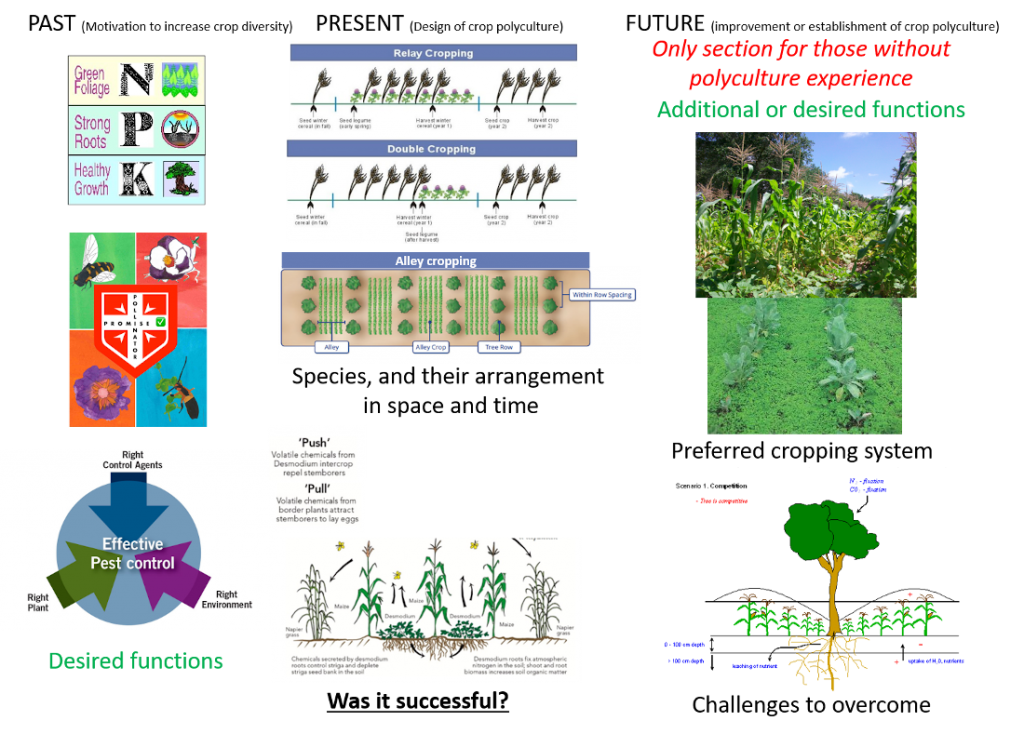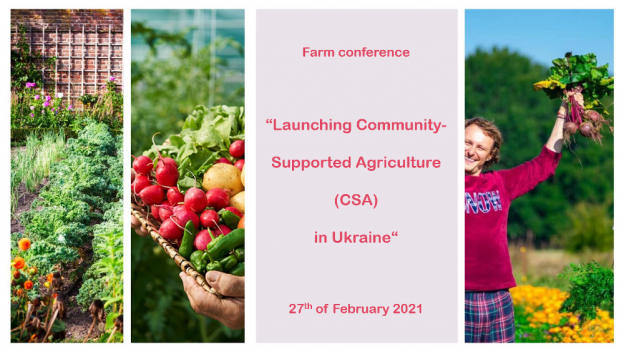Invitation to participate in research survey
Research project "Designing high-performance crop polycultures for community-supported agriculture (CSA)"
Dear CSA growers of vegetables and leafy greens!
NGO "Permaculture in Ukraine, The Leibniz Centre for Agricultural Landscape Research (ZALF), and Michael Succow foundation are kindly asking you to share your experience in growing polycultures with vegetables and leafy greens by participating in this survey (also available in German).

The goal of the study is to increase the environmental stability and economic returns of farms by designing effective polycultures. The term “polyculture” refers to simultaneous cultivation of several crops (or also livestock) on the same land.
The output of the project will be decision support tool for designing polyculture schemes for temperate climate tailored for small and medium producers, in particular for CSA growers where collected growers’ experience will be combined with the information from the academic and professional literature. Our approach towards designing crop polycultures lies in maхimising diversity of crop traits across time and space in combination with multifunctional (of permaculture) system optimization based in crop integration within farm functional zones, management requirements, similar processing, resource needs and growth characteristics.
Learn more about designing crop polycultures from these video lectures (also available in Czech, Hungarian, Polish, Slovak languages, and an extended materials for university student), Discover about the linkage between permaculture and polycultures from the video clip “Mosaic Landscape”, presentations, proceedings and resolution from research and practice conference “Polycultures and Permaculture”.
Follow project updates on Facebook project page Polycultures and Permaculture.
Conference
Farm conference “Launching Community-Supported Agriculture (CSA) in Ukraine" was organized on 27 of February 2021. See recorded conference presentations, presenters, participants, agroecology peer support groups. Link to page in Ukrainian.
Community-Supported Agriculture
Community-Supported Agriculture (CSA) is a partnership between a farm and consumers where the risks and rewards of farming are shared. This contemporary model of agriculture is based on traditional connections between a city and a village and its popularity is growing fast in Europe and worldwide. Direct linkage between farmer and consumer has proven its benefits for both parties at the time of COVID-19 pandemic when the interest towards CSA increased twofold.
CSA has multiple benefits:
10 benefits for farmers and rural community
- Secure market which is less sensitive to lockdown and price fluctuations. Continuous positive dynamics of CSA growth in Europe and worldwide.
- Upfront investment from consumers at the beginning of growing season, less dependency on bank loans and escape from corporate control in general.
- Fair price on produce (due to elimination of intermediaries as well as expenditures on certification).
- Increased social protection, healthy on-farm environment for farmers and for their families, rich and interesting life in a big community of likeminded people. Attractive environment for youth and for revitalization of rural lifestyle.
- Possibility to spend more time on farming and less - on marketing and fundraising.
- Encouragement to implement ecological innovations in agriculture in a trusted and supportive environment between farmer and customers, where all parties equally share challenges and risks.
- Motivation to diversify produce helps to develop agronomically feasible crop rotations, supports more workplaces and development of food processing infrastructure, and which aids in maintaining soil fertility (also because of crop-livestock integration).
- Opportunity to diversify farm business with agrotourism and educational activity.
- Performing multiple social missions: local community development, supporting vulnerable groups, decreasing negative impact from food systems.
- Help from customers with farming operations, crop harvesting, developing sale logistics, produce pickup or delivery.
10 benefits for customers and urban communities
- Getting diverse seasonal ecological produce for a premium price (less transportation costs for local produce, no commission for traders and shops because of direct sale, no expenses for certification because of trusted relations, reduced taxes in some models).
- Always fresh, tasty and nutritious produce that is picked ripe in local production (fruits are often picked unripe in long-distance trading, as well as modern varieties with extended shelf-life are preferred, and fruits are chemically treated for ripening and for longer storage).
- Preference to seasonal produce reduces the negative impact of agriculture on the environment and increases general food diversity and quality. Ethical farming of animals under mutual agreement.
- Supporting ecological and family farms that promotes rural development and improves working and living conditions for farmers.
- Food supply is less sensitive to lockdowns and other social and economic disasters.
- Saving time for food shopping. Possibility for home delivery in convenient time in some models. Less time spent in crowded places.
- Diverse educational opportunities: from cooking using seasonal products to ecological gardening.
- Opportunities for agritourism, outdoor activities, reconnecting with nature and with food growing for both adults and children.
- Reduced food packaging and food carbon footprint, possibility for recycling urban food waste.
- Community of like minded people for joyful, active life and for implementation of social projects. Establishing constructive relations with neighbors.
Agroecology of CSA
We invite you to join international peer support groups for CSA farmers:
CSA in the Visegrad countries, in Europe, and in Ukraine
See links to CSA networks:
- Germany,
- Czech Republic,
- Hungary,
- Poland,
- Slovakia,
- Europe
- Ukraine - discussion groups: general coordination group, Kyiv and North, Kharkiv and East, Lviv and West, Center and South.
Project and Partners
The project is supported by the Michael Succow Foundation and German-Ukrainian Cooperation in Organic Agriculture. The conference is organized in collaboration with the Visegrad and Beyond Permaculture Partnership.
Within this project we will also:
-
- Translate into Ukrainian the European Handbook on Community-Supported Agriculture (see translation).
- Provide recommendation on polyculture schemes (intercropping and crop rotation) for vegetables and leafy greens based on survey of CSA farmers and on reviewing academic and professional literature. We invite farmers, researchers and extension specialists (designers) to participate in our survey. Follow project updates on Facebook.
- Compose recommendations for Ukrainian government on supporting development of CSA and the regional food systems.
URGENCI
URGENCI promotes all forms of partnership between producers and local consumers, all kinds of Community Supported Agriculture initiatives, as a solution to the problems associated with global intensive agricultural production and distribution.
DYNAVERSITY
DYNAVERSITY analyses and describes the actors involved in plant genetic conservation for agriculture in order to suggest management and governance models and to construct new forms of networking.
The Leibniz Centre for Agricultural Landscape Research (ZALF) e.V.
ZALF Programme Area 3: Agricultural Landscape Systems
WG DESCO: Land Use Decisions in the Spatial and System Context
Lead: Annette Piorr
What we do:
-
-
- We examine agriculture and its actors in their interaction with the surrounding landscape and with the food system.
- We analyse transformations and integrate a prospective perspective on future developments and trends (e.g. climate change, digitalisation, agricultural and climate policy, nutrition habits).
- In this way we develop cooperative strategies for more sustainable agricultural landscape systems together with stakeholders.
-
Our research questions are:
-
-
- How do different systems develop and what contribution can they make at landscape level to achieve sustainability objectives?
- Which determinants and patterns do they follow?
- How can they be strengthened in urban rural interactions?
- How do land use, value chain and food system interact and how to develop concepts to coordinate them in such a way that the sustainability of regions is strengthened?
-



